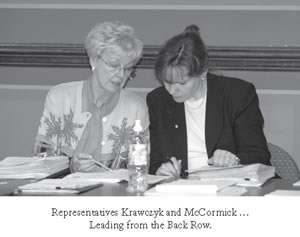
Upon entering the state and federal capitols across the United States and walking the hallowed chambers of the legislative bodies, you may see formal seating assignments that determines who someone is, what that person will be, and what he or she will be allowed to accomplish.
Those who wield power in their respective front rows make these decisions.
“In reality there is perhaps no one of our natural passions so hard to subdue as pride. Disguise it, struggle with it, beat it down, stifle it, mortify it as much as one pleases; it is still alive and will now and then peek out and show itself.”
—Benjamin Franklin
THE FRONT ROW AND ITS IMPORTANCE
There is a physical front row that faces the lecterns of power, separating the lieutenants and generals from the main body of both political parties. There is also an aisle that divides the two major political parties, the Democrats and the Republicans. The lines drawn between the political insiders (the front row) and the political outsiders (middle and back rows) are much less known but far more important. The caveat is dysfunctional leadership. Front row division from members in the middle and back rows is far more divisive when led by dysfunctional leaders than any political party differences.
When the House was in session, and we were called to caucus on Fourth Floor North, I would sit in the back row. The real debates were hidden from public view, and they were held in our party caucus rooms. I chose the back remembering an old family lesson dating back to the Civil War: “Keep your back to the wall”—a saying handed down to me from my great-grandfather.
Sitting alongside me was a woman who was to become my colleague and closest ally, Judith Ann Krawczyk. We were both “freshmen legislators” in 2001, a term used to keep wide-eyed new legislators in line. I was a fresh-faced politician, full of big ideas and an even stronger sense of purpose, given the fact that I was the state’s original charter school law author as a private citizen. My sense was that I could make a larger impact now that I was an actual member of the state legislature.
Little did I realize how very naive that thought was.
Representative Judy Krawczyk was sixty years young and full of street smarts and common sense. She often told me, “I have a nose for people and I can smell trouble.” The day we met, we were both sensing the building tension and political posturing. At the moment that we were to be introduced to our party’s caucus on the fourth floor, both of us looked around the room. It resembled a high school auditorium on the first day of fall classes. “Let’s sit in the back,” we both said at the same time.
Sitting in the front row is a subconscious clue to the aspirations of those occupying those seats. They’re there for power, control, to be heard and to lead their own agendas. Yet little do they realize that leaders are all around them in that room—some of us are sitting behind the white pillars in our state and federal capitols, watching and listening. When the time is right, we’ll lead right from where we sit. Unfortunately for the front, many of us lead very well from the back row.
From the back I could see the entire political class, the orchestrated moves in our caucus from the lieutenants who were instructed to agitate votes during our discussions. I could easily see the cupped hands and silent whispers of instruction given to the whips who paced about at the end of the aisles. There were more times than I’d like to admit when I saw talented legislators ostracized and used as “examples” by the leaders in the political class. These legislators were verbally browbeaten and torn down in front of the body. A few of us stood up to intervene; Representative Krawczyk and I were such bold ones.
Unfortunately, the damage had already been done, as many of these individuals would resign shortly thereafter. The games played by those sitting in the front row were brutal. Many colleagues had short-lived political careers at the hands of the front-row elite, whose jealousy and petty games were aimed at weeding them out and driving them away from government service. Little did I know that my choice to sit in the back had afforded me a label of someone who would be quiet and submit to the rules of the front row.
Before we get too far into the dysfunctional aspects of lawmaking, perhaps it is time to show you a chart of “How a Bill Actually Becomes a Law.” You may be surprised to learn about the contrast between the ideal on paper and the reality of the political game, as it is played today.
The following chart focuses on the legislative body, the lawmakers. On paper, there are three readings of the bill—first, when it is introduced and referred to committee; second, when the bill comes up before either body (Senate or House); and third, when the bill is read for its last time before it is voted on by the body. A conference committee follows, if both houses pass a different version of the same bill, to work out the differences between the Senate and the House. The final product is then enrolled and sent to the governor’s desk for his/her signature…To continue reading this book, get your copy of “What Sex is a Republican” in paperback or Kindle edition on Amazon.
About the Author:
Terri McCormick is an author, policy expert, educator, and former state representative to the Wisconsin State Legislature. Today, she offers her expertise in public and government relations through McCormick Dawson CPG Ltd., a trusted consultancy of independent contractors.
Ms. McCormick serves as president and CEO of the company, drawing from more than two decades of professional experience, a strong educational foundation, a host of industry-related publications, and a multitude of accolades, awards and formal recognitions. Holding a Master of Arts in administrative leadership from Marian University, and a Bachelor of Science in political science and public administration from the University of Wisconsin, Ms. McCormick received both degrees with high honors.
“What Sex is a Republican?” is sold on Amazon in both the paperback edition as well as Kindle edition. Read reviews on Amazon here.



